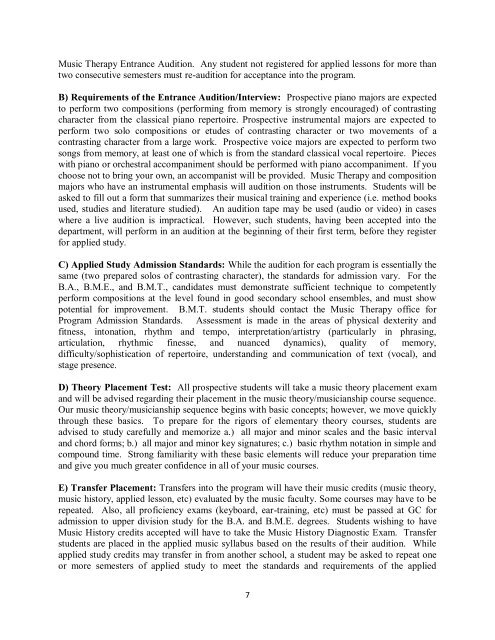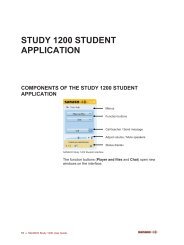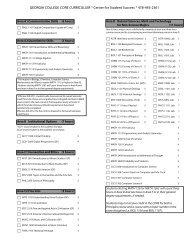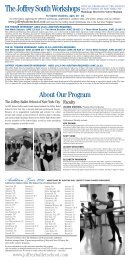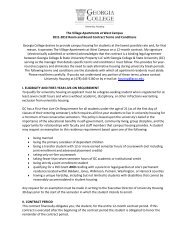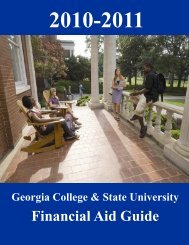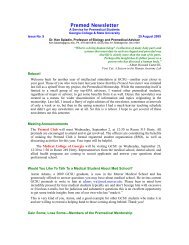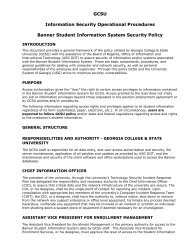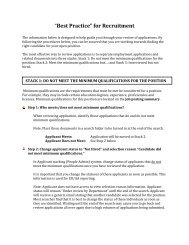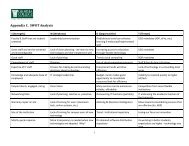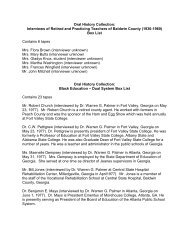click here (pdf) - Georgia College & State University
click here (pdf) - Georgia College & State University
click here (pdf) - Georgia College & State University
Create successful ePaper yourself
Turn your PDF publications into a flip-book with our unique Google optimized e-Paper software.
Music Therapy Entrance Audition. Any student not registered for applied lessons for more than<br />
two consecutive semesters must re-audition for acceptance into the program.<br />
B) Requirements of the Entrance Audition/Interview: Prospective piano majors are expected<br />
to perform two compositions (performing from memory is strongly encouraged) of contrasting<br />
character from the classical piano repertoire. Prospective instrumental majors are expected to<br />
perform two solo compositions or etudes of contrasting character or two movements of a<br />
contrasting character from a large work. Prospective voice majors are expected to perform two<br />
songs from memory, at least one of which is from the standard classical vocal repertoire. Pieces<br />
with piano or orchestral accompaniment should be performed with piano accompaniment. If you<br />
choose not to bring your own, an accompanist will be provided. Music Therapy and composition<br />
majors who have an instrumental emphasis will audition on those instruments. Students will be<br />
asked to fill out a form that summarizes their musical training and experience (i.e. method books<br />
used, studies and literature studied). An audition tape may be used (audio or video) in cases<br />
w<strong>here</strong> a live audition is impractical. However, such students, having been accepted into the<br />
department, will perform in an audition at the beginning of their first term, before they register<br />
for applied study.<br />
C) Applied Study Admission Standards: While the audition for each program is essentially the<br />
same (two prepared solos of contrasting character), the standards for admission vary. For the<br />
B.A., B.M.E., and B.M.T., candidates must demonstrate sufficient technique to competently<br />
perform compositions at the level found in good secondary school ensembles, and must show<br />
potential for improvement. B.M.T. students should contact the Music Therapy office for<br />
Program Admission Standards. Assessment is made in the areas of physical dexterity and<br />
fitness, intonation, rhythm and tempo, interpretation/artistry (particularly in phrasing,<br />
articulation, rhythmic finesse, and nuanced dynamics), quality of memory,<br />
difficulty/sophistication of repertoire, understanding and communication of text (vocal), and<br />
stage presence.<br />
D) Theory Placement Test: All prospective students will take a music theory placement exam<br />
and will be advised regarding their placement in the music theory/musicianship course sequence.<br />
Our music theory/musicianship sequence begins with basic concepts; however, we move quickly<br />
through these basics. To prepare for the rigors of elementary theory courses, students are<br />
advised to study carefully and memorize a.) all major and minor scales and the basic interval<br />
and chord forms; b.) all major and minor key signatures; c.) basic rhythm notation in simple and<br />
compound time. Strong familiarity with these basic elements will reduce your preparation time<br />
and give you much greater confidence in all of your music courses.<br />
E) Transfer Placement: Transfers into the program will have their music credits (music theory,<br />
music history, applied lesson, etc) evaluated by the music faculty. Some courses may have to be<br />
repeated. Also, all proficiency exams (keyboard, ear-training, etc) must be passed at GC for<br />
admission to upper division study for the B.A. and B.M.E. degrees. Students wishing to have<br />
Music History credits accepted will have to take the Music History Diagnostic Exam. Transfer<br />
students are placed in the applied music syllabus based on the results of their audition. While<br />
applied study credits may transfer in from another school, a student may be asked to repeat one<br />
or more semesters of applied study to meet the standards and requirements of the applied<br />
7


